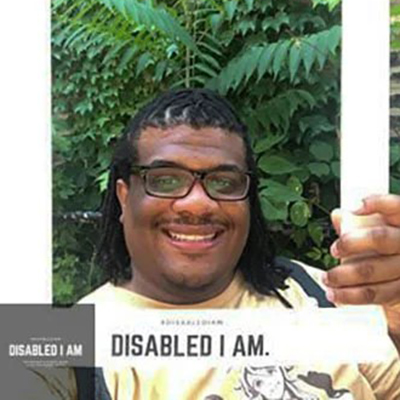IDHD researcher spotlights stories of disability
Text

T.J. Gordon Jr. centers the perspectives of disabled people in his work on disability rights and justice — an intuitive position in theory, though it is often neglected in practice.
As a researcher at the Institute on Disability and Human Development and an autistic self-advocate, Gordon has developed two projects collecting personal stories of both the struggle and the pride of living with disability.
Disabled I AM, a multimedia movement about owning one’s disability identity, began inside Access Living’s racial justice group, Advance Your Leadership Power. The group started by brainstorming ways to combat police violence against people of color in Chicago, especially disabled people of color. The discussion expanded to consider the many intersections of disability identity with race, gender, sexuality and socioeconomic status.
“We were wondering who gets to decide what a disability is? Who gets to create that narrative?” Gordon said. “How do we create a space where people can talk freely about their disability identity without picking from any binary terms?”
In 2019, the group joined forces with Access Living’s women’s group, The Empowered Fe Fes, and secured fellowship funding from the Self Advocacy Resource and Technical Assistance Center to answer these questions in the form of a narrative social media project.
Residents of Access Living and people with disabilities outside of it posed for portraits in a frame with the label #DisabledIAM. The portraits were posted on social media with the hashtag and short reflections of what their disability identity meant to them. When the COVID-19 pandemic required social distancing, the project went fully virtual. Participants could take selfies with a #DisabledIAM filter, expanding the movement beyond the physical space of Chicago.
“It became so big that we reached people all throughout the United States,” said Gordon. “It was powerful.”
The next phase of Disabled I AM refocused the work back in the city, again collecting portraits and reflections but using them to create a story map. The map situates personal stories of disability within the real spaces of Chicago.
“The goal was to have people explore how their disability identity is tied to their neighborhood and things that need to be done to address living with disability in their ward.”
The story map illustrates diverse experiences in every corner of the city, not limiting representation to the North Side neighborhoods that tend to receive the most resources and attention. Gordon’s intention is not only to highlight these unique experiences, but to engage community stakeholders and alderpeople. He hopes people in power will use the map to find representatives of disability in their wards with whom they can collaborate to make improvements.
“Some wards have been more inclusive and accessible; others are working on it; others unfortunately have not been. But it’s still cool to see stories of access and inclusivity not just in Rogers Park or Lakeview, but in Kenwood too. Why don’t we ever get to hear those stories?”
The #DisabledIAM story map is a living project. People residing in the city of Chicago who identify with having a disability and want to share their stories are invited to fill out this questionnaire.
Gordon’s second ongoing project focuses on former high school athletes with disabilities. Gordon grew up in a sports-obsessed household and became an accomplished young athlete. After his sports career ended and his research career began, he started dreaming up ways to combine his two passions.
“I benefited from the lessons of what inclusion can look like in sports and from living out my dream of playing varsity just like everyone else.”
Gordon seeks stories from athletes who played an IHSA sport and graduated in 2022 or earlier. Interested participants can fill out this form until June 5 at 11:59 pm CST, when submissions close.
The project is part of Gordon’s Illinois Partners in Policymaking fellowship, where he is learning how to present advocacy issues to legislators, businesses and others with decision-making power.
“Folks would love to hear not only about the games played, the skills learned and the teammates connected with, but also about how high school associations can better include people with disabilities and make their programs adaptive,” Gordon said. “Maybe they can add competitions that haven’t been considered yet, like fantasy sports or card games.”
The primary target for the project is IHSA athletes, but eventually Gordon hopes to expand it nationwide, repurposing the storytelling techniques that worked so well in the Disabled I AM campaign.
Gordon has concrete goals and suggestions to increase access and inclusion — in neighborhoods, in sports systems, in everyday life — but he knows the path to material improvement is not to stand alone lecturing at the powers that be.
“With both projects, the end goal is sharing different stories as far as we can on disability culture, showing that there’s more to disability than advocacy. It’s a whole set of human experience with lots of layers.”